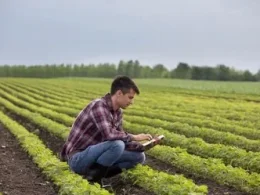More than 70% of farmers have already seen large impacts of climate change on their farm, according to new global research across 8 countries.
A recent study by Bayer, a leading life science company, reveals that the effects of climate change are being felt by farmers worldwide, with many reporting significant changes to their crops, livestock, and overall farming practices.
Climate change is having a profound impact on agriculture, with rising temperatures, changing precipitation patterns, and increased frequency of extreme weather events all taking a toll on farm productivity and profitability.
According to the study, 71% of farmers have already seen significant changes to their crops, including changes in growth patterns, yields, and quality. Meanwhile, 64% of farmers have reported changes to their livestock, including changes in behavior, health, and reproduction.
“Climate change is a major threat to global food security, and it’s essential that we take action to mitigate its impacts on agriculture,” said Dr. Robert Fraley, Bayer’s Chief Technology Officer.
The study also found that farmers are adapting to the changing climate by adopting new technologies, such as precision agriculture and climate-resilient crop varieties, as well as changing their farming practices, such as shifting to more sustainable irrigation methods.
However, despite these efforts, many farmers are struggling to cope with the impacts of climate change, and more needs to be done to support them in their efforts to adapt and thrive in a changing climate.
Bayer is committed to helping farmers adapt to the challenges posed by climate change, and is working to develop new technologies and solutions that can help them build resilience and improve their productivity and profitability.
In addition to its research and development efforts, Bayer is also working with farmers, governments, and other stakeholders to promote sustainable agriculture practices and support climate-resilient agriculture.
“We believe that by working together, we can help farmers build a more sustainable and resilient food system that can meet the needs of a growing global population,” said Dr. Fraley.
“It’s a complex challenge, but we’re committed to doing our part to help farmers adapt to the impacts of climate change and build a more sustainable food future.”









